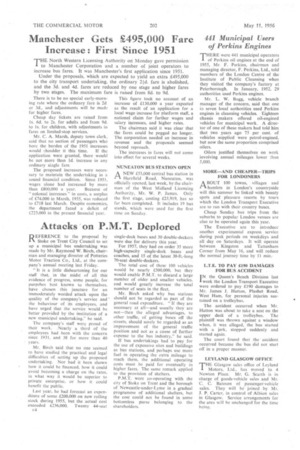Attacks on P.M.T. Deplored
Page 50

If you've noticed an error in this article please click here to report it so we can fix it.
D EFERENCE to the proposal by
Stoke on Trent City Council to set up a municipal bus undertaking was made by Mr. Raymond W. Birch, chairman and managing director of Potteries Motor Traction Co., Ltd., at the company's annual meeting last Friday.
"It is a little disheartening for our staff that, in the midst of all this evidence of progress, some people. for purpthes best. known to themselves, have chosen this juncture for an immoderately worded attack upon the quality of the company's service and ' the behaviour of its employees, and have urged that the service would be better provided by the institution of a new municipal undertaking," he said.
The company's staff were proud of their work. Nearly a third of the employees had been with the concern since 1931. and 38 for more than 40 years.
Mr. Birch said that no one seemed to have studied the practical and legal difficulties of setting up the proposed undertaking. Nor had it been shown how it could be financed, how it could avoid becoming a charge on the rates, in what way it would be superior to private enterprise, or how it could benefit the public.
Last year, he had forecast an expenditure of some £200,000 on new rolling stock during 1955, but the actual cost exceeded £236,000. Twenty 44-seat single-deck buses and 30 double-deckers were due for delivery this year.
For 1957, they had on order 35 more high-capacity single-deck buses and coaches, and 13 of the latest 30-ft.-long 70-seat double-deckers.
The total cost of these 100 vehicles would be nearly 1500,000, but they would enable P.M.T. to discard a large number of older and smaller vehicles. and would greatly increase the total number of seats in the fleet.
Mr. Birch asked why bus stations should not be regarded as part of the general road expenditure. "If they are necessary at all—and usually they are not—then the alleged advantages, to other traffic, of getting buses off the streets, should surely be regarded as an improvement of the general traffic position and not as a cause of further expense to the bus industry," he said.
If bus undertakings had to pay for the use of expensive sites and buildings as bus stations, and perhaps use more fuel in operating the extra mileage to reach them, the additional operating costs must be paid for eventually in higher fares. The same remark applied to the provision of shelters.
P.M.T. were co-operating with the city of Stoke on Trent and the borough of Newcastle-under-Lyme in a gradual programme of additional shelters, but the cost could not be found in some bottomless purse belonging to the shareholders.




























































































































